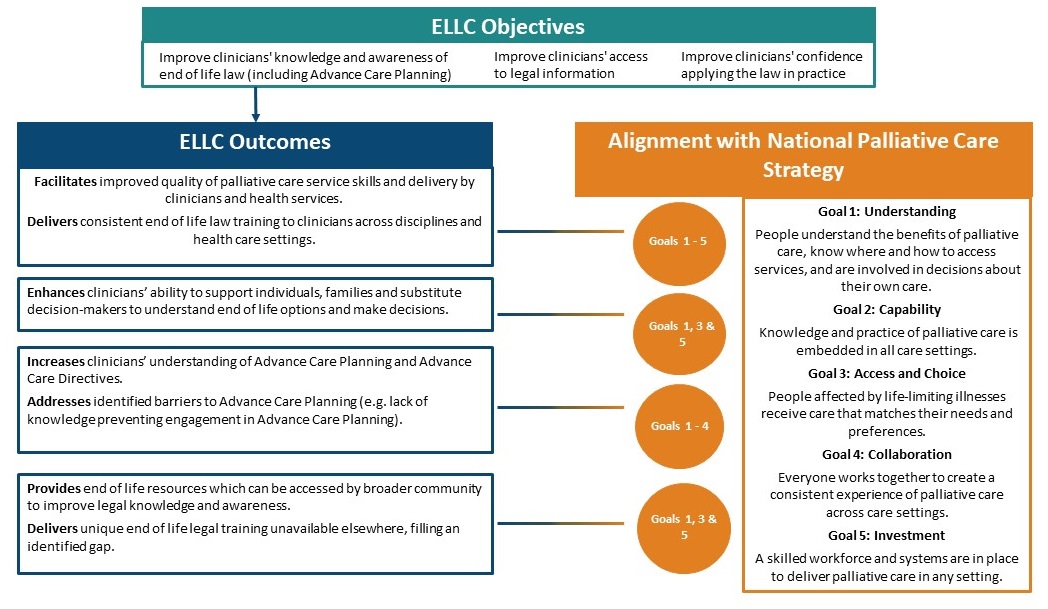End of Life Law for Clinicians: Supporting end of life and palliative care practice
A blog post written by Penny Neller, Professor Lindy Willmott and Professor Ben White, Australian Centre for Health Law Research, Queensland University of Technology (QUT)
Every day health professionals are called upon to make medical decisions at the end of life, including deciding whether to follow a person’s Advance Care Directive, determining the appropriate level of pain or symptom relief that can be given, or identifying the decision-maker for a person without capacity. This legal knowledge is a critical component of doctors’, nurses’, and other health professionals’ expertise. However, significant knowledge gaps about end of life law exist among clinicians, which can compromise quality of end of life and palliative care.
The need to improve legal knowledge among clinicians has been recognised by the Australian Commission for Safety and Quality in Health Care and three recent State and Territory parliamentary inquiries, each of which has recommended education for health professionals on end of life legal issues. End of Life Law for Clinicians (ELLC) is national training program that addresses this need. Established in 2017, ELLC aims to improve clinicians’ knowledge and awareness of end of life law, access to legal information, and confidence applying the law in practice.
The first phase of ELLC (July 2017 - June 2020) delivered 10 free 15-30 minute online training modules on common end of life legal issues, and clinical case-study workshops across Australia (including a webinar about an older person in residential aged care). From 31 January 2019 – 30 June 2020 approximately 2,300 clinicians and other participants registered for ELLC and completed nearly 9,000 training modules. Approximately 1,300 people attended ELLC workshops, and 7 Australian medical schools included ELLC in their resources or curriculum. 82% of online module participants had never completed education or training about the law relating to end of life decision-making prior to undertaking the ELLC training program.
Though initially developed for medical practitioners and students, nurses and allied health professionals (particularly paramedics and social workers) showed strong interest in the training. In phase one, 57% of ELLC’s participants were medical practitioners and medical students, and 35% were nurses and allied health professionals. The next phase of ELLC (July 2020 - June 2023) will expand and tailor delivery to better meet demand from nurses and allied health professionals, as well as continuing delivery to medical specialists and trainees, junior medical practitioners, and medical students.
In addition to delivering the original 10 modules (updated and tailored to the specific training needs of the broader audience), new content will be produced including resources for clinicians working with specific populations at the end of life. These will focus on care for older people, people living with disability, Aboriginal and Torres Strait Islander people, people who identify as LGBTIQA+, and people from culturally and linguistically diverse backgrounds. Many individuals from these populations experience significant disparities in end of life care compared with other community members. Examples are where clinicians do not correctly identify the person’s appropriate substitute decision-maker, a common issue for same-sex couples, or where clinicians are unfamiliar with the role of family members and community in decision-making for some people from Aboriginal and Torres Strait Islander or culturally diverse backgrounds. ELLC’s resources will support clinicians to provide responsive, patient-centred care to meet the unique end of life care needs of people from these populations.
ELLC will also continue to deliver clinical case-study workshops and webinars across Australia. ELLC is complimented by End of Life Law in Australia, a website that provides user-friendly information for the community about end of life law in each State and Territory.
By enhancing existing resources, expanding to new audiences, and developing new content, ELLC will continue to support clinicians’ delivery of quality end of life and palliative care, in line with the guiding principles of the National Palliative Care Strategy 2018 (refer to Figure 1 below).


Ms Penny Neller, Project Coordinator, National Palliative Care Projects, Australian Centre for Health Law Research, Queensland University of Technology

Professor Lindy Willmott, Australian Centre for Health Law Research, Queensland University of Technology
.jpg)
Professor Ben White, Australian Centre for Health Law Research, Queensland University of Technology